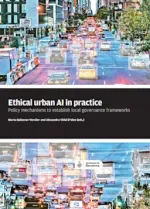Abstracts part I

Accountability and transparency in urban AI / Shazade Jameson
Many urban public administrations see the potential of implementing artificial intelligence (AI) but feel unprepared for how to do so responsibly. While responsible AI approaches and frameworks are increasingly popular, much of these focus on private or industrial actors. Though there is increasing attention to the role of responsible AI in the public sector, there is much less guidance for local governments specifically. This chapter aims to narrow the gap by presenting definitions of accountability and transparency that include both narrow technical and broader sociopolitical perspectives. To facilitate accountability and transparency in the context of implementing AI by urban public administrations, there are two deceptively simple yet fundamental guiding questions for the design phase: “Should AI be used?” and “How is AI to be used?” After reflecting on what these questions mean for urban practitioners, the chapter presents a summary of existing policy mechanisms which can be adapted to work towards these aims and offers some lessons learned from previous research.
Privacy and data governance in urban AI / Josuan Eguiluz Castañeira and Carlos Fernández Hernández
The development of ethical artificial intelligence (AI) in Europe, as envisioned by the European AI Act, must include robust mechanisms for privacy and data management. In the context of public-urban environments, the processing of personal data through AI systems presents specific challenges that public authorities will need to address carefully. In light of this new legislative framework, the purpose of this article is to: (i) present the legal and ethical framework regulating the processing of personal data via AI systems in urban settings; (ii) outline key mechanisms to implement the principle of privacy; and (iii) examine the challenges associated with such data processing practices, providing a set of recommendations and best practices.
Fairness and non-discrimination in urban AI / Leandry Junior Jieutsa
Artificial intelligence (AI) is an emerging, disruptive and ambivalent technology. As part of its deployment, cities need to put various mechanisms in place to ensure that this technology has the least possible negative impact on people and communities. The aim is to ensure that cities remain fair spaces that leave no one behind. This chapter, subdivided into three sections, formulates policy recommendations for integrating aspects of fairness and non-discrimination into the deployment of AI by cities. The first section discusses the notions of fairness and non-discrimination in urban settings and introduces the factors determining fair and non-discriminatory AI. The second section explores the opportunities and impacts of AI in cities. Finally, the third section proposes policy recommendations for fairer AI in cities. These recommendations take into account the different roles that cities can play in the deployment of AI as in-house solution developers, deployers and regulators. Cities need to be agile, relying on participation, local approaches, sociotechnical innovation, collaboration and so on.
Sustainability in urban AI / María Pérez-Ortiz
The chapter explores the potential of artificial intelligence (AI) to support the development of sustainable cities, addressing the social, environmental and economic dimensions of sustainability. As urbanisation accelerates globally, cities face increasing challenges in areas such as mobility, housing, pollution and resource management. AI holds promise for optimising urban infrastructure, reducing emissions and improving resource efficiency; however, its deployment also raises concerns about social equity, environmental impact and economic disruption. Sustainable AI is proposed as a framework for aligning AI’s development and application with sustainability goals, ensuring it operates within ecological limits, promotes inclusivity, and supports equitable and circular economic growth. Key areas of focus include minimising AI’s carbon footprint through energy-efficient practices, embedding fairness in AI-driven urban systems and ensuring transparent governance. The paper provides policy recommendations to guide AI deployment in urban settings, emphasising international collaboration, ethical governance and economic policies to foster resilience and inclusivity in the cities of tomorrow.